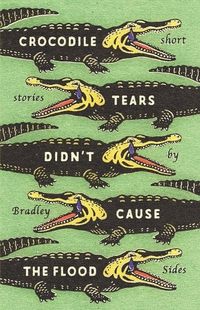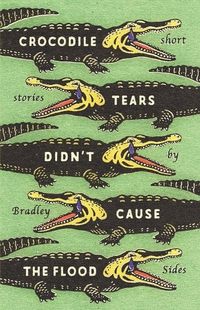 Crocodile Tears Didn’t Cause the Flood
Crocodile Tears Didn’t Cause the Flood
DETAILS: Publisher: Montag Press Publication Date: February 6, 2024 Format: eARC Length: 142 pg. Read Date: February 23-26, 2024

What The $#*! Did I Just Read?
This is a selection of short—sometimes very short—stories that the publisher describes as “magical realism.” Which I guess is fitting—some seem more like SF, Fantasy, or somewhere in-between, than what I think of as “magical realism.” But I’m not going to be finicky about the label—call it whatever you want, as long as “strange” fits into the definition. Because “strange” is the best word to describe every story (even if other words would do better for specific entries). And I truly mean that in the best of ways.
The other element element that characterizes these stories is “Southern Fiction.” This is incredibly apt—even when a story doesn’t mention a locale, or use a colloquialism or slang to show that this is Southern, there’s something about them that just screams Southern Fiction. You know it when you see it.
Economy Of Words
Other than “strange,” “weird,” and so on, the word that comes to mind when describing this book is “Economical.” How anybody can create a tone/tenor, voice, world, and characters in so few words time and time and time again is beyond my ken.
Sure, there are a handful of apocalypses in this book—but they’re distinct. The stories don’t feel like they’re talking about the same World-Ending Event (and they’re not, but you’d halfway expect them to feel similar). The monsters in Story X wouldn’t fit into Story Y, and probably wouldn’t even be noticed as all that monstrous in Story Z.
Bradley Sides is a skilled and gifted writer and you can see that on pretty much every page.
* I think “every page” would be a better way to put it, but let me understate it just in case there are 1-3 that miss.
So, what did I think about whatever that $#*! was?
The question that I started this post with is something I put in my notes more than once. And with maybe one exception, I followed it with “But I’m glad I read it.”
So, the collection started roughly for me—I liked the writing, but the story did nothing for me, but the second? “The Guide To King George” knocked my socks off. Most of the rest did, too. The titular story seemed like a miss to me, too (but what a great title).
Some of these made me laugh and/or chuckle—like the story of the young vampire girl who is desperate to leave her family farm, or the Choose Your Own Adventure story about a Father and Son during an apocalypse—but I stopped chuckling soon and shifted into something else. The setup to “Nancy R. Melson’s State ELA Exam, Section 1: The Dead-Dead Monster” was delightful, even if I felt guilty for being delighted by the end.
Then there are the sobering stories, the heart-wrenching stories. So many captivating, unnerving, and something-in-the-neighborhood of hopeful ways to look at death.
I really can’t explain this collection, as I think I’ve demonstrated pretty well here. I’m sure others can, and you should look for their comments. But I’ll tell you this, you’re not going to find many collections that are as pound-for-pound good as this one. Even when the story doesn’t quite strike you as successful or entertaining as the rest, you’re not going to forget it soon, or regret the experience.
Go grab a copy.
Disclaimer: I received this eARC from the author and Lori Hettler of The Next Best Book Club in exchange for this post—thanks to both for this.

This post contains an affiliate link. If you purchase from it, I will get a small commission at no additional cost to you. As always, the opinions expressed are my own.
![]()




Read Irresponsibly, but please Comment Responsibly